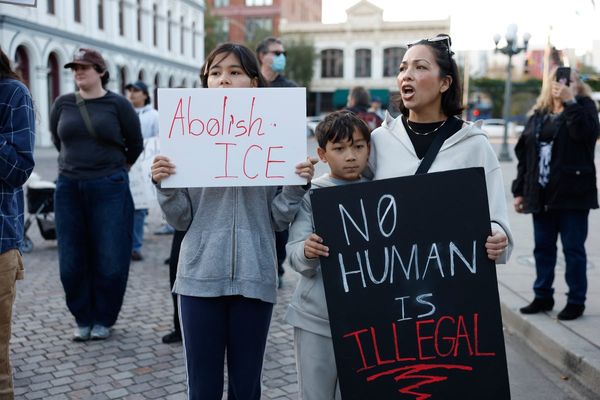
Ada Konstantine could vote, drink and drive a car. But as they were 19 years old, their employer, Grill’d, was legally able to pay them just $16.50 an hour – $3.38 less than the hourly national minimum for their age.
If Konstantine worked at the fast food chain’s airport store, their rate bumped up an extra $2. While employed at Grill’d, Konstantine never got weekend or public holiday rates.
“So the most I ever got paid to work at Grill’d was $18.50 an hour, and I was living out of home, paying rent, paying bills,” Konstantine says.
The reason Konstantine got paid less than minimum wage was simple: their employment at Grill’d was contingent on completing a certificate three in hospitality. Grill’d, a nationwide burger chain, and other employers are legally allowed to use government-subsided training to pay these workers less than minimum wage.
Unions are calling for the abolishment of junior rates (often known as a training wage) for over-18s and want an end to traineeships because the schemes exploit young workers, they claim. They also want the minimum wage for people aged 18 to 21 raised in line with the $24.10 adult wage.
But business groups argue that paying young workers more would cut their employment opportunities.
Konstantine says they had to sign up to the traineeship to get the job at Grill’d.
“They were very insistent upon it,” Konstantine says. “I asked if I could opt out of it, and they said, ‘Unfortunately not.’
“So it was either I took the [traineeship] or I didn’t have a job at Grill’d.”
Because Konstantine didn’t get penalty rates on weekends or public holidays, they supplemented their wage with the youth allowance.
“I ate a lot of pasta and a shit tonne of rice,” they said. “I don’t want to exaggerate anything, it truly was pure misery. It really sucked.”
A Grill’d spokesperson said its traineeship program “provides foundational training”.
“Grill’d would like to clarify that all team members have a choice regarding their employment pathway and team members will be recruited in different ways depending upon their skills and experience,” the spokesperson said in a statement.
“Grill’d is committed to the ongoing development of trainees and supporting them through their learning journey.”
This year Konstantine started a new job. The higher casual rate has meant they can afford to eat and live better and start studying at university.
Under current laws, workers younger than 21 get a percentage of the $24.10 hourly adult minimum wage: 20-year-olds are paid $23.55, 19-year-olds receive $19.88 and 18-year-olds get $16.46.
Backed by the Australian Council of Trade Unions, the SDA – one of the unions for retail, fast food and warehouse workers – has lodged an application at the Fair Work Commission seeking to remove junior rates for employees aged 18 and older, lifting all ages to $24.10 an hour.
The SDA also want rates for 16-year-olds lifted to 50% of the minimum wage, up from 47.3%, and 75% for 17-year-olds, up from 57.8%.
Felicity Sowerbutts, the director at the Youth Workers Centre, points to a 2022 report from the McKell Institute which showed young workers were earning $3.5bn less compared with what they would earn on the adult rates. She said the majority of that was going into the pockets of big businesses including Coles, Woolworths and McDonald’s, who could afford to pay workers properly.
“They are large companies … worldwide companies, they can afford to pay young workers a living wage,” Sowerbutts says.
The United Workers Union wants an overhaul of the traineeship system.
Tim Kennedy, the UWU’s national secretary, accused employers of “exploiting a loophole in workplace laws to pay people well below what’s needed to get by”.
Those systems, he says, were “forcing people on to traineeships” and “relying on the disparity that’s created with junior rates”.
Zahra is a manager on a part-time contract at Hungry Jack’s in regional Victoria. This month, after turning 18, her pay went up 10% to $19 an hour.
“We are one of the best-paid fast food [businesses] and we still don’t get paid that much,” she says.
Zahra is saving and wants to buy a house by the time she turns 23. But without an adult wage saving is difficult, she says.
“If you’re working full-time, you’d be getting [about] 30% less than an adult would,” she says. The difference over a year “could be thousands of dollars”.
A spokesperson for Hungry Jack’s says it is “transparent in its workplace agreements and complies with relevant legislation”.
Bran Black, the chief executive of the Business Council, which represents employers, says raising the minimum rate would disincentive businesses to employ younger, less-experienced staff.
“We’ve already seen such a huge amount of industrial relations change over the last two years that businesses are saying we just can’t take any more,” he told the ABC.
Kerry Brown, a professor of employment and industry at Edith Cowan University, says the youth rate was established to boost employment. Youth unemployment in October was 9.3%, more than double the 4.1% for adults.
Employing young people helps them to gather experience and fosters mentoring in the workplace, she says.
“As you gather that experience, you work towards the adult rate.”
Without the lower rates, Brown says youth unemployment will go higher.
But Konstantine, who can now afford to live in a rental with their partner instead of a rundown share house, says the low rates of pay held them back.
There was no way they would have been able to enrol at university while working at Grill’d, they say. “It just wouldn’t have been feasible.”







